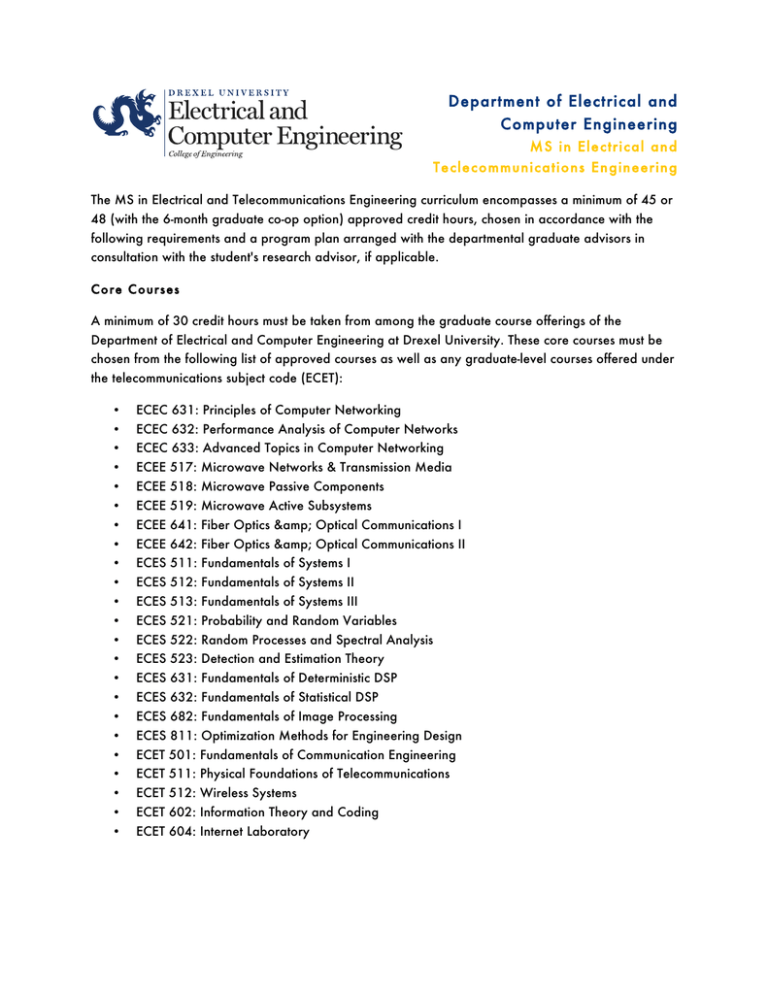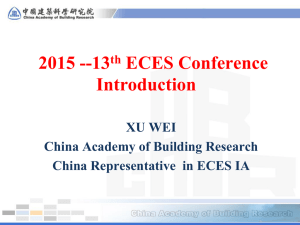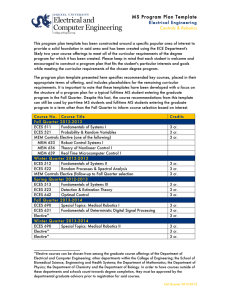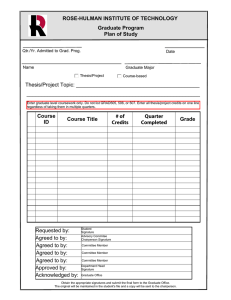Department of Electrical and Computer Engineering MS in Electrical and
advertisement

Department of Electrical and Computer Engineering M S in Electrical and Teclecommunications Engineering The MS in Electrical and Telecommunications Engineering curriculum encompasses a minimum of 45 or 48 (with the 6-month graduate co-op option) approved credit hours, chosen in accordance with the following requirements and a program plan arranged with the departmental graduate advisors in consultation with the student's research advisor, if applicable. Core Courses A minimum of 30 credit hours must be taken from among the graduate course offerings of the Department of Electrical and Computer Engineering at Drexel University. These core courses must be chosen from the following list of approved courses as well as any graduate-level courses offered under the telecommunications subject code (ECET): • ECEC 631: Principles of Computer Networking • ECEC 632: Performance Analysis of Computer Networks • ECEC 633: Advanced Topics in Computer Networking • ECEE 517: Microwave Networks & Transmission Media • ECEE 518: Microwave Passive Components • ECEE 519: Microwave Active Subsystems • ECEE 641: Fiber Optics & Optical Communications I • ECEE 642: Fiber Optics & Optical Communications II • ECES 511: Fundamentals of Systems I • ECES 512: Fundamentals of Systems II • ECES 513: Fundamentals of Systems III • ECES 521: Probability and Random Variables • ECES 522: Random Processes and Spectral Analysis • ECES 523: Detection and Estimation Theory • ECES 631: Fundamentals of Deterministic DSP • ECES 632: Fundamentals of Statistical DSP • ECES 682: Fundamentals of Image Processing • ECES 811: Optimization Methods for Engineering Design • ECET 501: Fundamentals of Communication Engineering • ECET 511: Physical Foundations of Telecommunications • ECET 512: Wireless Systems • ECET 602: Information Theory and Coding • ECET 604: Internet Laboratory Elective Courses The remaining courses needed to reach the minimum credit hour requirement for the degree program are considered elective courses. Elective courses can be chosen from among the graduate course offerings of the Department of Electrical and Computer Engineering (ECE, ECEC, ECEE, ECEP, ECES, ECET); other departments within the College of Engineering (AE, CHE, CIVE, CS, EGEO, EGMT, ENGR, ENVE, MATE, MEM); the School of Biomedical Science, Engineering and Health Systems (BMES); the Department of Mathematics (MATH); the Department of Physics (PHYS); the Department of Chemistry (CHEM) and the Department of Biology (BIO). Operations Research graduate-level coursework in the Department of Decision Sciences (OPR) may also be taken towards completion of this requirement. In order to have courses outside of the departments, schools and subjects listed above count towards degree completion, they must be approved by the departmental graduate advisors prior to registration for said courses. Please note that ECEC 500 (Fundamentals of Computer Hardware) and ECEC 600 (Fundamentals of Computer Networks) do not count towards the credit requirements needed to complete the MS in Electrical Engineering degree program. M aster's Thesis & Independent Research Although not required, MS students, especially those interested in eventually pursuing a Ph.D. or entering a research-intensive career, are encouraged to complete a Master's Thesis as part of their MS studies. It is also possible for MS students to engage in research for academic credit outside of the scope of the Master's Thesis option. This research is still performed under the supervision of a faculty member; however, the end result is not submission of a Master's Thesis. This option is best suited for those students interested in gaining exposure to the research process and environment without the commitment to writing a thesis or for those students interested in delving deeper into a topic that is outside the scope of the normal graduate course offerings. Regardless of whether or not a Master's Thesis is being completed, a total of 9 credits of researchintensive coursework (ECEx 697, ECEx 898, ECEx 997 & ECEx 998) may be counted towards the minimum credit hour requirement for the MS degree program. These credits are counted as core courses. Graduate Co-op Program MS students may choose to participate in the graduate co-op program, where up to 6 credit hours can be earned for up to a six-month full-time co-operative education experience in industry, working on curriculum related projects. Students participating in a three-month full-time co-op experience will earn 3 credits, which are considered an elective course. Students engaging in a six-month full-time co-op experience will earn 6 credits, 3 credits of which are considered an elective course; the other 3 credits are considered as an additional course, increasing the total minimum credit requirement for graduation from the MS program with a six month full-time graduate co-op to 48 credits.




![Computer Networks [Opens in New Window]](http://s3.studylib.net/store/data/008975473_1-426936d686925c93036d8f878e710c04-300x300.png)
